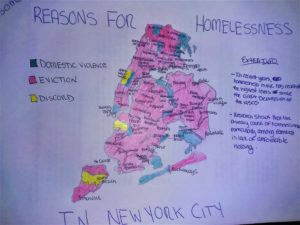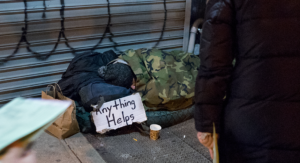Homeless Not Hopeless: Stop Stigmatizing The Homeless

Throughout the world, many societal concerns are often disregarded and neglected while the majority distract themselves with trivial things in life. One particularly ignored and increasing issue is homelessness and the services we provide or lack thereof to assist them. Homelessness is a problem that is prevalent in urban areas such as NYC and will only continue to progress as populations increase and the cost of living rises. Although there is a common misperception surrounding the homeless (such as homelessness being a product of personal choices), one isn’t truly aware of the circumstances beyond their control. Therefore, they should not be mistreated nor criminalized due to the effects they face of an unjust society. It is our responsibility to care for those in these unfortunate situations because without our contribution, life is brutal and much harder.
Homeless individuals have long been stigmatized and blamed for their situations without consideration nor sympathy. Many are quick to presume that the displaced are lazy, addicts, mentally unstable, and most commonly that it’s their fault they ended up where they are in life. According to the following multimedia source “We’re Not Trash:’ Homeless People Fight Stigma In Moving Video,” Goldberg states “We recently interviewed a number of homeless people to give them the chance to address the standard stereotypes passersby are quick to label them with, and dispelled each one” (Goldberg, Eleanor.“’We’re Not Trash:’ Homeless People Fight Stigma In Moving Video.” HuffPost, HuffPost, 2 Oct. 2015). The video focuses on several people who live on the streets who are strong and dedicated, and who defy false assumptions made about them. It elaborates on how homeless people are human beings as well despite these stereotypes, no different from you and I. In order to eliminate the misconceptions associated with homelessness, we should engage with the individuals in these unfortunate situations. Without this communication, it is difficult to understand someone’s context and as a result, easy to adhere to a stigma. (Video Down Below)

This shows the harsh and heartbreaking reality of the homeless. Many have become numb to the sight but yet are quick to make assumptions.
In addition to faulty stereotypes, the displaced also face many challenges both emotional and physical. There are numerous saddening stories of homeless people, including their experiences of being thrown out, struggling to get a job, struggling to obtain a meal, getting beaten and robbed, etc. The article “Eyes of the homeless reveal stories of heartache, hope,” by Jae Hong and Brian Melly, includes real experiences of those who are homeless, demonstrating the hardships and obstacles many have faced. When speaking about one of the homeless victims (Harris), Hong and Melly state, “Harris said he has had AIDS for 30 years. When medication stopped working, he got depressed and was evicted. Now he feels like an outcast, vulnerable and struggling to survive” (Hong, Jae, and Brian Melley. “Eyes of the Homeless Reveal Stories of Heartache, Hope.” AP NEWS, Associated Press, 7 Nov. 2017). The writers also include Harris’ own words stating “I’ve been beaten, robbed, chased… People steal your tents and your tarps and your clothes. I’ve lost everything I owned.” This provides insight on just a quarter of what so many experience and how devastating these effects have on a person, which is why judgment shouldn’t be passed on these individuals nor mistreatment.
 As a result of stereotypes and unfortunate circumstance, many homeless people are unjustifiably criminalized, harassed, and mistreated. Based on the article “Building A Movement To End Homelessness,” the criminalization of homelessness refers to “measures that prohibit life-sustaining activities such as sleeping or camping, eating, sitting, and/or asking for money/resources in public spaces” (“Criminalization Of Homelessness.” National Coalition for the Homeless, National Coalition, 2019). The article further explains that many who are forced to carry out these life-sustaining activities in public spaces have been penalized despite the lack of adequate affordable housing and shelter space. Overall, these measures prove to be counterproductive to ending homelessness, not only does it violate their rights but adds to their difficult situations as well. From the petition “Stop Criminalizing Homelessness in New York City” the writer firmly states “It is not illegal to be poor. It is not illegal to be homeless. Those living in poverty and are homeless are trying to figure out where their next meal is coming from, dealing with stigma, and unfortunately laws and policies are making their situation even more difficult.” (Flannelly, Riyan. “Sign the Petition” Change.org, 2016,). Ultimately, the homeless should not be criminalized because every day is a battle, whether being misjudged or figuring out where to sleep, what to eat, etc. and to be picked on for that is demoralizing and inhumane.
As a result of stereotypes and unfortunate circumstance, many homeless people are unjustifiably criminalized, harassed, and mistreated. Based on the article “Building A Movement To End Homelessness,” the criminalization of homelessness refers to “measures that prohibit life-sustaining activities such as sleeping or camping, eating, sitting, and/or asking for money/resources in public spaces” (“Criminalization Of Homelessness.” National Coalition for the Homeless, National Coalition, 2019). The article further explains that many who are forced to carry out these life-sustaining activities in public spaces have been penalized despite the lack of adequate affordable housing and shelter space. Overall, these measures prove to be counterproductive to ending homelessness, not only does it violate their rights but adds to their difficult situations as well. From the petition “Stop Criminalizing Homelessness in New York City” the writer firmly states “It is not illegal to be poor. It is not illegal to be homeless. Those living in poverty and are homeless are trying to figure out where their next meal is coming from, dealing with stigma, and unfortunately laws and policies are making their situation even more difficult.” (Flannelly, Riyan. “Sign the Petition” Change.org, 2016,). Ultimately, the homeless should not be criminalized because every day is a battle, whether being misjudged or figuring out where to sleep, what to eat, etc. and to be picked on for that is demoralizing and inhumane.
Altogether, the homeless are no different from us, therefore shouldn’t be treated in any rude or discriminatory demeanor. Some people disagree with the mindset that the homeless are disruptive and should be held responsible for their actions as well as choices. Applying that perspective justifies passing judgment on individuals you don’t know or their situations which I don’t agree with. Regarding my personal life, a member of my family had become homeless, living out of his car as well as house hopping. Witnessing what was said about him and knowing otherwise was eye-opening as to how people are so quick to say something without knowing the facts. Overall, it is important to acknowledge and be mindful of the everyday struggles and suffering of the homeless because they don’t deserve to be stereotyped nor mistreated.
Sources:
- “Criminalization Of Homelessness.” National Coalition for the Homeless, National Coalition, 2019, https://nationalhomeless.org/issues/civil-rights/.
- Flannelly, Riyan. “Sign the Petition.” Change.org, 2016, https://www.change.org/p/bill-de-blasio-stop-criminalizing-homelessness-in-new-york-city.
- Goldberg, Eleanor. “’We’re Not Trash:’ Homeless People Fight Stigma In Moving Video.” HuffPost, HuffPost, 2 Oct. 2015, https://www.huffpost.com/entry/were-all-human-were-nottrash-homeless-people-would-like-you-to-know_n_560e24d0e4b0dd85030b88fc.
- Hong, Jae, and Brian Melley. “Eyes of the Homeless Reveal Stories of Heartache, Hope.” AP NEWS, Associated Press, 7 Nov. 2017, https://apnews.com/0c142bf9fd1342c2a36f4a28030c1d2c/Sorrow,-heartache,-hope:-Eyes-of-homeless-offer-hint-of-life



